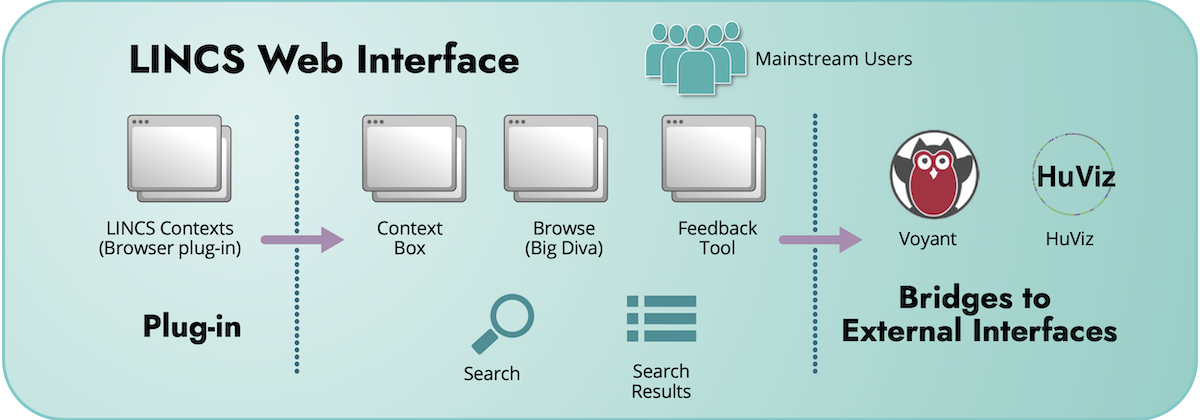Access
LINCS will provide access through several core interfaces to promote the use of Linked Open Data through a catalogue, a search tool, and a graph-based browsing tool. There will also be a context box connected to the LINCS knowledge graph that will serve information about an entity in the context of a document. Search results will be available in various list formats as well as a graph visualization.
Where possible, tools will be implemented as stand-alone web services, with APIs to support third-party use. Components will be modular: able to function individually, integrated within a workflow, or built into another system. The architecture will support further tool development for the wide range of use cases emerging from the academy and beyond. Code will be open-source, and open design principles will allow others to build interfaces for their own data and plug LINCS tools into other environments.
LINCS and our partners will be holding workshops on methods of accessing, querying, and using linked data and knowledge graphs, as well as on conversion tools. Hackfests for researchers and partners will develop methods and capacity for integrating LINCS tools into partner interfaces.
Access to LINCS Data
LINCS will be both generic, in permitting different query types on data converted from very different sources, and precise, in allowing researchers to drill down to specific domain vocabularies and highly specialized subsets of content. LINCS builds its access plans on successful models, such as the Situated Networks and Archival Contexts project for an access interface, the DPLA for a developer interface, and the Humanities Networked Infrastructure interface for engaging users with linked data.
Through LINCS, Canadian researchers will have unparalleled access to cultural heritage content, and our cultural heritage will receive unprecedented exposure. This includes copyrighted data: our published record is so young that the lack of access to digital collections for analysis has significantly impeded research on Canadian culture, but LINCS will be able to elucidate, for instance, the massive but protected HathiTrust Digital Library datasets. Access tools will ensure data mobilization across the full spectrum of mainstream and technical researchers.
Conversion Access
For interfaces, LINCS will point to and document a number of options, as opposed to creating a one-size-fits-all platform. Experienced researchers will have tools to prepare data for LINCS, and the less technical will be supported by partners such as CWRC.
LINCS extends or adopts several existing tools and platforms designed for humanities researchers. For instance, the output of the Recogito interface development by the Pelagios project for spatial markup and creating gazetteers can be converted and further enhanced to produce a more fully featured RDF representation of the contents. LINCS extends CWRC and the widely used Voyant text analysis and visualization suite. The programming notebook method will document customizable processes for converting diverse datasets and help to promote the development of coding skills.

